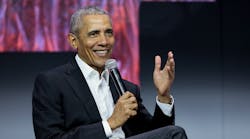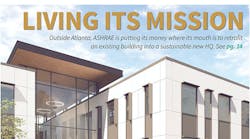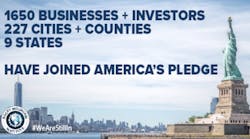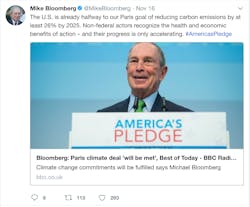By ELIZABETH BEARDSLEY, Senior Policy Counsel, USGBC
On November 11, America’s Pledge on Climate co-chairs Michael Bloomberg and California Governor Jerry Brown released America’s Pledge Phase 1: States, Cities, and Businesses in the United States Are Stepping Up on Climate Action.
The report analyzes climate action by U.S states, cities, businesses and universities in support of the Paris Agreement.
Read it here.
A large number of these nonnational leaders have made commitments to achieving the climate goals of the Paris Agreement for our nation, some before and others since the U.S. administration announced its intent to pull out of the Paris Agreement. USGBC, which is taking part in COP23, signed on to the We Are Still In open letter earlier this year, which now includes over 2,500 U.S. states, cities and businesses declaring support for the Paris Agreement. Taken together, these commitments represent more than half the U.S. economy and population.
Even more states, cities and private actors are taking actions that reduce greenhouse gas emissions, whether motivated by climate concerns, economics, risk reduction or other factors. The America's Pledge on Climate initiative, launched in July 2017, collects and shares data on the actions of states, cities and businesses to drive down their greenhouse gas emissions consistent with the goals of the Paris Agreement. The report provides a valuable snapshot of where we are in the transition to a clean energy economy, and compiles key policies that benefit the climate in the public and private sectors.
We know that climate change is both the greatest challenge and the greatest economic opportunity for the U.S., and green buildings are one of the critical ways we can both combat climate change and enhance our economy. Indeed, the report points to state and city municipal green building programs as evidence of how nonfederal actors have been early leaders in reshaping markets.
For more on COP23 and USGBC, click here.








